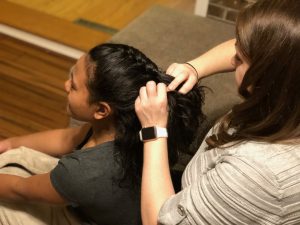My daughter has very thick beautiful curly hair. Her hair often needs a little extra care and attention. But she (understandably) isn’t always a big fan of the detangling process or the time and siting still that taking care of her hair requires. As a white mom with straight hair I’ve had to make it a priority to learn how to help my transracially adopted daughter take care of her hair, what products work best, and make time in our schedule to make it happen! After several failed attempts, I reached out to others with similar hair for advice. Throughout the process I have learned that there is more to hair than just style.
Making time
It takes time to brush, detangle, condition, and style hair. Our family is not exactly the morning type, so we needed to figure out something that we could do at night so there was less to do in the mornings. Many nights after showers I would braid my daughter’s hair so that in the morning, she could finger out her hair, tangle free, and go on her way. This was a fairly simple solution that benefited us in more ways than just my daughter’s hair. The less stress and the easier the flow of our daily routine the better. Making it a priority to help your child take care of his or her hair is important and shows that you care. My daughter recently had to get up super early for a cheer competition and we knew there wouldn’t be time to curl and tame her hair in the morning. So, we used hair curlers at night that she slept in (dad even helped with this adventure!). In the morning all we had to do was take the curlers out, put her hair in a high pony tail and add a big cheer bow and go! Thinking and planning ahead made for a smooth and easy early morning.
Building attachment
Spending one-on-one time doing your child’s hair is a great way to build attachment. Parents can use this time to talk about what is going on in their child’s life, share stories, laugh and joke around. Another benefit of doing my daughter’s hair is that her love language is physical touch, and this was another way I could show her that I loved her through her love language. But physical touch is important in building attachment regardless of if it is your child’s love language or not. If you’ve studied attachment you may be familiar with John Bowlby’s research into the effects of physical touch and its role in the development of attachment. Bowlby’s attachment theory determined that nurturing touch was a key factor for a child to develop secure attachment to his caregiver. I don’t think that the hair style is the most important thing my daughter and I have gained from our experience, I think our relationship and attachment was the ultimate reward.
Self-esteem
I attended a breakout session at an adoption conference a few years ago entitled “What My White Parents Didn’t know and Why I turned out OK Anyway” by April Dinwoodie, a transracially adopted person and Chief Executive of the Donaldson Adoption Institute. One of the most important nuggets of information she said that stuck with me was, “When I think about the evolution of my identity, one thing that literally and figuratively rises to the top – my hair!” I don’t think that hair defines who you are but when your hair looks nice it can help give you an extra self-esteem boost.
If you are struggling to care for your child’s hair reach out to others who are on this journey with you. For more styling tips or ways to start a hairstyling routine with your child check out Rory Mullins’s book Chocolate Hair Vanilla Care: A Parent’s Guide to Beginning Natural Hair Styling. Mullins is an adoptive mom who also learned how important hair care is and that there is more to doing your child’s hair than just the style.
